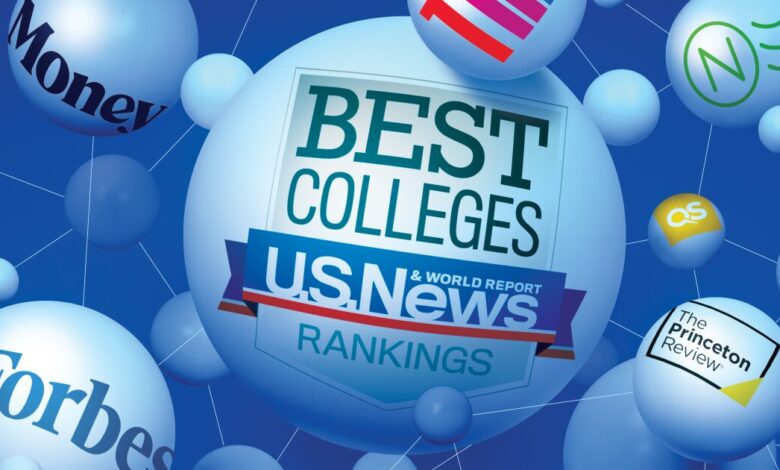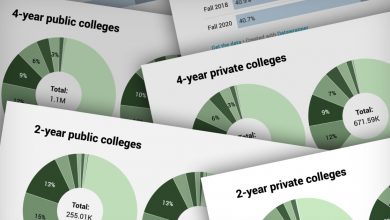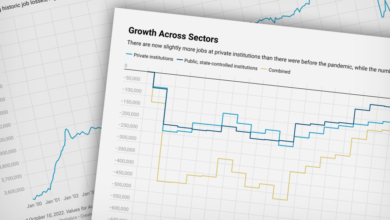‘U.S. News’ Took a Hit on Rankings. Its Competitors Say They’re Doing Just Fine.

Since last fall, as dozens of colleges boycotted U.S. News & World Report’s lists of best law, medical, and undergraduate programs, other publications and companies that craft college rankings have been watching.
But they’re not worried by what they see. They say their rankings are different.
“The central criticisms that I’ve read” — such as how frequently U.S. News changes its methodology, and its reliance on a reputational survey — “I don’t believe that those criticisms are ones shared by Niche,” said Luke Skurman, founder and chief executive of Niche, which ranks undergraduate programs in the United States.
“We don’t see ourselves as being in the same space, really,” said Phil Baty, who edited Times Higher Education’s World University Rankings from 2009 to 2019 and is now its chief global-affairs officer.
“We’ve always attempted to help our communities feel like they have a little bit of ownership for the way in which we are measuring them,” said Ben Sowter, senior vice president for institutional performance at QS, which has its own World University Rankings, after breaking off from Times Higher Education in 2009. QS has “more of a partnership relationship” with colleges than U.S. News appears to, Sowter said.
In addition to keeping in touch with college leaders through conferences and an advisory board, QS sells much more extensive consultancy services to campuses than does U.S. News, whose rankings editors say they see themselves as journalists providing outside accountability to colleges.
But that close relationship hasn’t immunized QS from controversy. After a methodology change this year, several South Korean institutions’ standings fell by hundreds of places. In response, every ranked university in the country threatened together to “withdraw from QS rankings permanently.” Sowter has been communicating with the universities’ leaders, he said, and hopes over time to persuade them to stay.
Changing Under Pressure
Money magazine is the only college ranker that told The Chronicle it had made changes this year as a result of public criticism of U.S. News. Money published star ratings for colleges for 2024, rather than rankings, a move that some rankings critics have long suggested would be more accurate and helpful to prospective students.
Leaders at Forbes, Niche, the Princeton Review, QS, and Times Higher Education all said they had no plans to change their ways because of the U.S. News rankings revolt of 2022-23. (Of those, the Princeton Review is arguably the most different. It profiles 300-some “Best Colleges” each year, but they aren’t ordinally ranked. Its eclectic lists, like “Best Career Services,” “Financial Aid Not So Great,” and “Reefer Madness,” are based on student-opinion surveys.)
A few rankers have overhauled their methodologies recently, reacting to larger trends in the sector. In 2021, Forbes took into account for the first time how many Pell Grant recipients colleges enrolled. The change nodded toward criticism that rankings tend to reward colleges for educating the wealthy and privileged, and punish them for serving low- and middle-income students. In the methodology for Niche’s 2024 rankings, due to be published later this year, editors are removing admitted students’ test scores and adding an “economic mobility” measure. The company is responding to the number of colleges that have dropped testing requirements, and students’ and families’ increasing anxiety about student-loan debt, Skurman said.
In QS’s contested new methodology, the company added one measure it calls “sustainability” and another named “employment outcomes.” The additions reflect increasing concern about both paying for college and how rankings can worsen inequality — the “sustainability” metric doesn’t just attempt to measure how environmentally friendly a college is, but also its “social impact,” through data points such as how many female faculty members it has.
But prestige and reputation still matter. Although it’s worth less this year than last, the most influential factor in QS’s methodology remains “academic reputation,” as measured by a survey of scholars. Skurman wouldn’t share Niche’s 2024 methodology, but in 2023 the criterion with the greatest weight, coming in at about 7 percent, was the proportion of applicants a college accepts. U.S. News dropped selectivity as a factor in 2018, reacting to criticism that the metric is gameable and fosters an obsession with a handful of brand-name colleges.
QS, Sowter said, is on “the beginning of a journey to start recognizing some of the alternative excellence that institutions around the world are demonstrating.”
Over the past two decades, there’s been a “tectonic shift” in how students and families think about college, said Rob Franek, editor of the Princeton Review. Its audience, he said, used to worry primarily about getting into dream schools. Now the worry is not getting snowed under with debt. The companies in the business of helping students choose colleges — and of defining dream schools — have responded accordingly.
An Exchange of Benefits
U.S. News responded to the revolt by saying it would rank the protesting colleges and schools anyway. If faced with a similar situation, the competitors interviewed for this article said they could do the same, although most rely, more or less, on surveys and data they receive directly from colleges. Niche is an exception, using all data that is either publicly available or gleaned from its own surveys of prospective students, who create accounts on its website. Yet Niche depends on the colleges, too. The company makes money in part by selling premium profiles to institutions, which allow admissions officers to spruce up their college’s Niche page with photos, videos, and fresh data.
And distaste for one ranker doesn’t translate into a boycott of them all. Columbia University and the Rhode Island School of Design, both of which have announced they will no longer cooperate with U.S. News’s undergraduate rankings, have premium profiles on Niche. RISD and Bard and Colorado Colleges, all U.S. News undergraduate boycotters, return data surveys from the Princeton Review. Spokespeople at RISD and Colorado College said their admissions offices had found the Review helpful in getting their names in front of prospective students.
Leon Botstein, Bard’s president and a longtime U.S. News critic, elaborated on what he sees as the crucial difference between the Princeton Review and U.S. News. “One seems a guide, which could be useful,” Botstein said. “The other claims to authority and a quantitative ranking between and among institutions, which seems frankly preposterous.”
Source link






